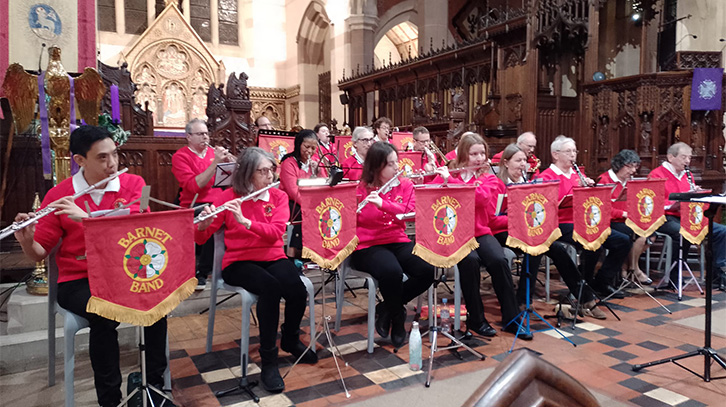Barnet Band: a story of adaptability, community and musical growth
As part of Making Music’s 90th anniversary celebrations, we’re speaking to some of our long-standing member groups about their history, their impact, and their hopes for the future.
One such group is Barnet Band; a thriving community wind band with a rich past and a forward-looking spirit. We spoke to Sue Dunn, the band’s Secretary, and Ian Merryweather, its Chair, both of whom have been involved since the early 1990s.
From brass to wind: reinvention and resilience
Barnet Band’s story stretches back more than 125 years. Originally a prize-winning brass band, it was deeply rooted in the local community, performing at civic events and raising funds through local donations. In its early days, the band even owned its own instruments, loaning them to players to ensure access.
By the early 1980s, however, the band had dwindled to just six members. A shortage of brass players and competition from nearby championship-level bands made it difficult to sustain the traditional format. The turning point came when conductor Dennis Collings, a local wind and saxophone teacher, invited his pupils and other young musicians to join. The band was reimagined as a wind band, welcoming flutes, clarinets, and saxophones, and began to grow again.
‘It’s still the same band, essentially,’ says Sue. ‘Just in a different format.’
A welcoming musical home
Ian joined the band in 1992 after meeting members at a music course in Hitchin. Sue followed in 1993, after her previous band folded. ‘Ian said, ''Why don’t you come along to Barnet Band?'' she recalls. ‘And I’ve been there ever since.’
The band now has around 38 to 40 members, with a mix of long-standing players and newer recruits. Some members have returned after years away, often when their children are grown up or even to play alongside them. ‘We’ve had people come back with their children,’ says Sue. ‘It’s lovely to see.’
There’s no formal audition process. ‘We’re a community band,’ Ian explains. ‘We don’t have entry requirements beyond enthusiasm. People come along, try it out, and decide for themselves if it’s the right level. Some come back later when they’ve improved.’
Strength through commitment
One of the band’s strengths is its consistency. ‘We have a solid core of players who turn up week in, week out,’ says Ian. ‘That makes a big difference. Some higher-level bands rely on guests for concerts, but we rehearse with the same people we perform with. It’s more satisfying.’
The band does occasionally augment its forces, especially for concerts requiring a full brass or percussion section, but the foundation is strong. ‘We’ve recently gained a tuba player, which is fantastic,’ says Sue. ‘We’d still love more cornets, trombones, and French horns, though.’
Music in the community
Barnet Band has a long tradition of community engagement. For many years, they’ve performed concerts in aid of local charities, where the charity sells tickets and keeps the proceeds. ‘It’s a great model,’ says Sue. ‘They bring their supporters, do front-of-house, maybe run a raffle, and we cover our costs.’
The band also works closely with the Mayor’s Office, performing at events like Holocaust Memorial Day and Armed Forces Day at the RAF Museum in Hendon. ‘We play under the Lancaster bomber,’ Ian says. ‘It’s a spectacular setting and very memorable.’
Other regular events include a Last Night of the Proms-style concert at a local church, which began as a fundraiser for a new organ and has become an annual tradition. At Christmas, the band leads the carol service that concludes Barnet’s Winter Fair. ‘We used to busk outside,’ says Sue. ‘Now we’re invited into the church as part of the formal programme.’
In summer, the band performs at residents’ association fairs and other outdoor events, maintaining a visible presence in the community.
 Playing Christmas carols in St John's Church
Playing Christmas carols in St John's Church
A friendly, supportive culture
Barnet Band is known for its welcoming atmosphere. ‘We used to have tea breaks during rehearsals, which were great for socialising,’ says Sue. ‘Unfortunately, the school where we rehearse now charges for kitchen use, so that’s become harder.’
Still, the social side remains strong. ‘We go out for a Christmas meal: 25 or 30 of us,’ she says. ‘And new members often say how welcome they feel. People sit them down, talk to them, help them with the music. That makes a big difference.’
Musical growth and leadership
A major factor in the band’s recent development has been conductor Ian Brookman, who joined around seven years ago. ‘He’s a phenomenal teacher,’ says Sue. ‘He knows how to break a piece down and explain what he wants, without putting anyone on the spot.’
Ian agrees. ‘There’s a way of encouraging people without throwing your weight around. It works really well.’
Under his direction, the band has tackled increasingly ambitious repertoire, including Nigel Hess, the Overture to Candide and Gallimaufry by Guy Woolfenden; a piece they once found too difficult. ‘We tried it 15 years ago and couldn’t manage it,’ says Sue. ‘Now we can play it confidently.’
The band also borrows and lends music with other groups, trialling pieces before purchasing them; a practical and collaborative approach to expanding their library.
A repertoire for everyone
The band’s programming reflects its diversity. ‘We do marches, medleys, classical overtures, swing, jazz, even rock and roll,’ says Sue. ‘We’ve got Disney medleys for family concerts, and Blues Brothers for fun.’
Concerts often feature a light second half, especially for community or fundraising events, while the first half may include more challenging or esoteric works. ‘We usually have a few difficult pieces we work on over time, and easier ones we can pull out quickly,’ says Ian. ‘It keeps people interested.’
Planning for the future
Looking ahead, Sue and Ian hope to share more of the organisational load. ‘There’s a lot going on behind the scenes,’ Sue says. ‘People get an email with all the details, but behind that is a lot of paddling, like a swan gliding on the surface.’
The band aims to break even each year, with subscriptions covering running costs and concerts generating a small surplus. ‘That lets us buy new music or help someone with an instrument if needed,’ says Sue. ‘We’ve done that before.’
They’re also focused on succession planning. ‘We need to train up the next generation to take over,’ says Sue. ‘There’s more to it than people realise.’
Advice for other groups
What’s their advice for other community groups?
‘Make it a fun place to be,’ says Sue. ‘Somewhere people can improve, feel supported, and enjoy making music together. A place where it’s okay to make mistakes and learn.’
‘And get a good conductor,’ adds Ian. ‘It makes all the difference. If people know they’re going to have a good time and be well led, they’ll keep coming back.’
Find out more about Barnet Band and follow them on Facebook / X (Twitter)



